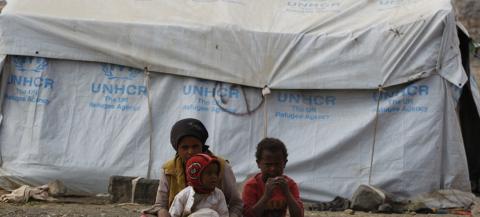Conflict, poverty and inequality undermine COVID-19 fight in Yemen


Yemen’s first laboratory-confirmed COVID-19 case marked a new milestone in its ongoing crisis and, left unmitigated, will worsen the world’s worst humanitarian and development crisis. The country’s acute vulnerability to the virus stems from over five years of conflict and an already devastated health system.
In a country of over 30 million, there are three doctors and seven hospital beds per 10,000 people, only 51 per cent of health facilities are fully operational and two-thirds of Yemenis have no access to basic healthcare. With limited testing capacity – including only three testing sites in Sana’a, Aden and Mukalla – the spread of COVID-19 will bring untold human suffering and will crush Yemen’s healthcare system.
Many Yemenis face underlying or unaddressed conditions that place them at greater risk and undermine the preparedness and response to COVID-19. Some of these include lack of food, health services and infrastructure as outlined in UNDP Yemen’s Impact of War studies. Even something as seemingly simple as handwashing is a luxury in Yemen as half the population lacks access to safe water, sanitation and hygiene. And social distancing for poor families and the 3.6 million internally displace persons who live in overcrowded locations appears impossible.
Combatting COVID-19 must not come at the expense of vital humanitarian assistance that will help address these issues. An insufficient humanitarian response will only force Yemen’s vulnerable population to adopt negative coping strategies to survive and will increase the risk of famine in a country where already more than 10 million people do not know from where their next meal will come.
Simply put, the lack of funding for COVID-19 and the defunding of the Humanitarian Response Plan cannot continue without catastrophic consequences. Already, 31 of Yemen's 41 United Nations programmes must either reduce their assistance or shut down completely if there is no more money.
The United Nations and our international and national partners have been working to create an effective and rapid health response that will help suppress the transmission, flatten the curve, and likely save countless lives. But we must not forget that a key underlying component of COVID-19 and its spread lies in severe inequality and deeply rooted poverty.
Unless there are robust social protection and economic recovery elements in the response, the pandemic will ravage the poorest and most unequal country in world. Yemenis need steady access to basic needs such as healthcare, food and income to help prepare for and fight the virus, and to allow any health response to be effective. Additional money is urgently needed to further scale-up social protection programmes and to safeguard Yemen’s fragile economy.

Yemeni officials on Monday condemned arrests and prosecutions by the Iran-backed Houthi militia directed against media, journalists and celebrities…

Yemen's warring parties are gearing up for new waves of conflict in 2023 amid a lack of decisive steps towards sustainable peace, adding to the suf…

The UAE will help to recruit doctors and deliver crucial supplies for hospitals in Yemen under a major healthcare drive. The Khalifa bin…